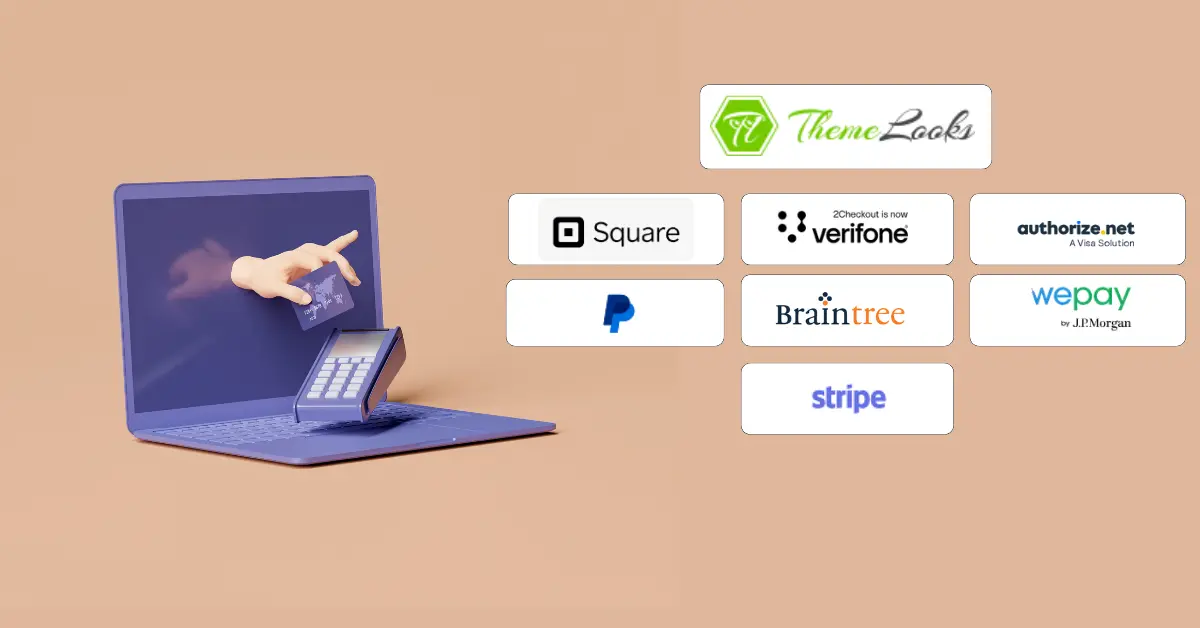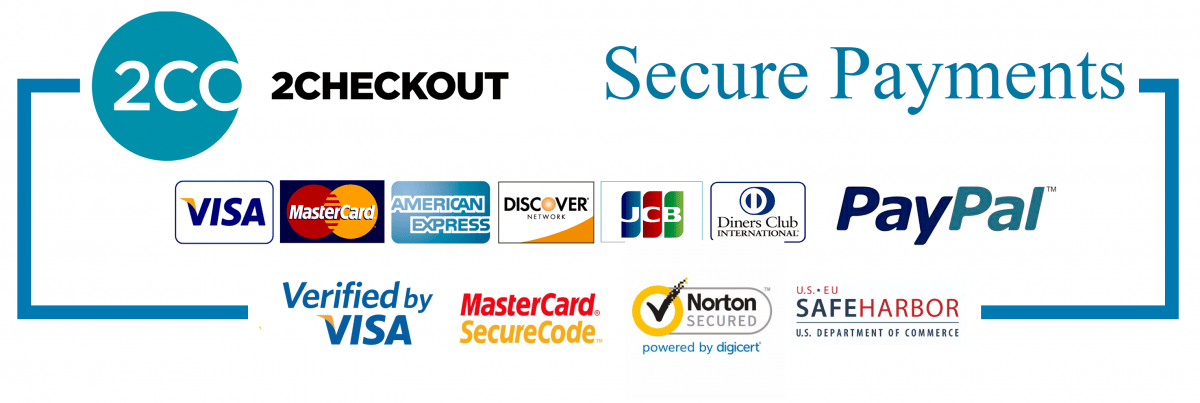
An online payment gateway helps businesses take payments safely and quickly. It works like a secure payment bridge between your website or store and the bank. This tool makes sure your payment info is safe when you buy something online. These digital payment services allow customers to pay with credit cards, mobile wallets, and other methods.
With the rise of online shopping, ecommerce payment tools like these have become very important. They keep payments simple and protect your money. Whether you use a credit card payment gateway or digital wallets integration such as Apple Pay or Google Pay, payment gateways make buying easy and safe for everyone.
If you want to find the Best Online Payment Gateways of 2025, you’ve come to the right spot. Read on for our complete list of the best online payment services this year!
Table of Contents
A payment gateway is a service that helps move money from your customer’s credit card or digital wallet to your business bank account. It’s part of bigger payment processing solutions that keep payments smooth and secure. It works like a safe bridge between your shop’s website or cash register and the bank. It quickly handles payments from credit cards or apps like digital wallets, so customers can pay without any hassle.
Payment gateways make buying fast and safe, whether online or in a local store. They keep your payment info super secure with secure payment processing. Payments go through quickly, so customers don’t have to wait. They support many ways to pay, like credit cards and mobile apps, making it simple for everyone. Plus, payment gateways work globally, letting people pay in different currencies from anywhere.
Payment gateways protect your payment details using several strong security tools that ensure online transaction security:
Top payment gateways follow strict PCI-DSS compliance rules to keep all payments safe and provide a secure checkout process you can trust.
When accepting card payments for your business, you’ll come across two key terms: payment gateway and merchant account. Both are crucial payment processing components, but serve different purposes. Below is a clear and simple explanation, along with a comparison table, to help you understand the differences between merchant account vs payment gateway.
| Feature | Merchant Account | Payment Gateway |
| Purpose | Holds funds temporarily from card transactions (merchant services explained) | Processes and transmits payment information securely (payment authorization systems) |
| Function | Acts as an intermediary bank account | Connects your website or POS to payment networks |
| Required For | Receiving and settling card payments | Authorizing and processing card payments |
| Setup | Often requires approval from a bank | Usually easier to set up, sometimes bundled with a merchant account (integrated payment solutions) |
| Fees | May have monthly, transaction, or setup fees (payment gateway fees) | Usually charges per transaction or monthly fees |
| Examples | Traditional banks, payment processors like Stripe (with a merchant account) | Stripe Gateway, PayPal, Square Gateway |
| Combined Services | Some providers include a merchant account in their gateway | Some gateways require a separate merchant account |
Online payment gateways help businesses accept payments safely and easily. They are a must-have in 2025 to keep customers happy, increase sales, and stay secure. This is especially important given the latest digital payment trends for 2025 and the rapid online payment adoption across industries. Here’s why they matter, explained in simple terms.
Young shoppers, like Gen Z and Millennials, spend over $350 billion each year. They want fast, easy ways to pay, like tapping their phone or using digital wallets such as Apple Pay or Google Pay. A 2025 study found that 69% of Gen Z and 60% of Millennials in Canada use mobile wallets, showing high mobile wallet usage statistics and clear Gen Z payment preferences. Without a payment gateway, businesses can lose these customers who expect quick and modern checkouts.
More people shop on their phones, and they want to pay with a single tap. In 2025, mobile payments made up 49% of online purchases, and this number will likely grow to 54% by 2026 — a strong indicator of mobile payment adoption and contactless payments growth. Payment gateways make it easy to offer options like Apple Pay or QR codes without complicated setups. This helps businesses keep up with what customers want — fast and simple payments.
A smooth checkout means more customers complete their purchases. Slow or confusing checkouts cause over 70% of shoppers to abandon their carts. Payment gateways like PayPal can increase completed sales by up to 44% with fast, one-tap checkouts. This is a prime example of ecommerce checkout optimization improving sales by improving conversion rates. They also keep payments safe with tools like encryption and fraud checks, which makes customers feel secure. In fact, 85% of shoppers trust businesses more when they see strong security and familiar gateway names like Stripe or PayPal.
For this writing, we examined a number of payment gateways based on several factors, including the type of payment, cost, ease of use, integrations, and support. These are our top 7 picks.
Founded in 1996, Authorize.Net is one of the oldest and most trusted gateways. It processes over a billion transactions per year and supports over 430,000 merchants worldwide.
Key Features:
Pros:
Cons:
Stripe is a developer-focused platform known for its powerful APIs and customization. It supports businesses of all sizes and offers global payment solutions in 135+ currencies.
Key Features:
Pros:
Cons:
Limited live customer support (mostly ticket-based) for lower-tier users
As one of the most recognized digital wallets, PayPal is trusted by millions. It’s easy to implement and offers flexible solutions for both individuals and businesses.
Key Features:
Pros:
Cons:
Square provides POS solutions for small businesses and mobile sellers. Founded by Twitter’s Jack Dorsey, it transformed mobile credit card processing with its free reader.
Key Features:
Pros:
Cons:
Owned by PayPal, Braintree offers a simple platform that supports multiple payment types, including Venmo and PayPal. It’s great for startups and SaaS companies.
Key Features:
Pros:
Cons:
WePay, integrated with Chase Merchant Services, is ideal for omnichannel sellers and crowdfunding campaigns. It supports complex payment workflows with ease.
Key Features:
Pros:
Cons:

Now part of Verifone, 2Checkout supports global payments in 200+ countries and territories. It’s perfect for businesses with international customers.
Key Features:
Pros:
Cons:
If you have a Travel Agency Website for flight, hotel, holiday, hostel, motel, resort, tour, trip, etc., booking, then you should go with Traffil – a Travel Booking Affiliate WordPress Theme designed for all kinds of Booking, Tourism, and Travel.
When choosing a payment gateway, pick one that fits your business and customers. Compare different options to find the best payment gateway features for you.
If many customers use phones, choose a mobile payment gateway like Apple Pay or Google Pay. For subscriptions, use a subscription billing gateway like Stripe or PayPal.
Make sure the gateway has PCI compliance for security and good fraud protection. Also, check if it offers easy ecommerce payment integration with platforms like Shopify or WooCommerce.
For international sales, pick a multi-currency payment gateway like 2Checkout.
Compare fees and test how fast and simple the checkout is. A good gateway keeps payments secure and helps your business grow.
If your business needs recurring payment solutions or a subscription management gateway—like a SaaS product, digital content, or subscription boxes—choose a gateway that automates:
Platforms like Stripe and Braintree excel in this area.
Advanced businesses often require tailored checkout experiences. Look for developer-friendly payment APIs such as:
This functionality is especially important for scaling businesses and marketplaces.
Make sure your gateway has strong ecommerce platform compatibility with platforms like:
The fewer plugins you need, the smoother the setup and maintenance.
If you sell internationally or via mobile:
Beyond PCI-DSS compliance, look for:
These tools protect your business and reduce revenue loss.
Choosing the best payment gateway depends on your business type and goals. For freelancers, PayPal and Square are top choices due to their quick setup and no monthly fees.
Small businesses benefit from gateways like Authorize.Net and Braintree, which offer strong security and support for recurring payments. SaaS companies need flexible payment processing with APIs and subscription tools, making Stripe ideal.
For global ecommerce, 2Checkout supports payments in 200+ countries and multiple currencies. Multi-channel businesses and crowdfunding platforms can rely on WePay for customizable checkout flows and fast deposits.
Pick a scalable payment gateway that fits your audience and helps your business grow smoothly.
Ans: Authorize.Net and Stripe are two of the safest payment gateways for small businesses. Both offer strong fraud prevention tools, including advanced encryption and PCI-DSS compliance. These features help protect your customers’ payment data and reduce chargebacks. Choosing a secure gateway builds trust with your customers and keeps your business safe from online payment fraud.
Ans: Yes, you can integrate multiple payment gateways on one website. Many ecommerce platforms like Shopify or WooCommerce support this feature. Using multiple gateways gives your customers more payment options and provides a backup if one gateway experiences downtime. It also helps you optimize transaction fees and improve the checkout experience by offering trusted brands.
Ans: For international sales, 2Checkout stands out because it supports over 200 countries and more than 100 currencies. It also offers localized checkout pages in multiple languages. This helps businesses provide a smooth buying experience for global customers, increase conversions, and manage cross-border payments efficiently while handling taxes and compliance.
Ans: Not always. Some payment gateways, like PayPal and Square, include a merchant account service within their platform. This means you don’t have to set up a separate merchant account with a bank. However, traditional gateways may require a separate merchant account, which acts as a holding place for funds before they are transferred to your bank.
Ans: Square is ideal for mobile sellers and event vendors because it offers a free, easy-to-use mobile POS system. It allows sellers to accept credit cards, mobile wallets, and contactless payments directly from smartphones or tablets. The fast setup and no monthly fees make Square perfect for pop-up shops, food trucks, and other mobile businesses.